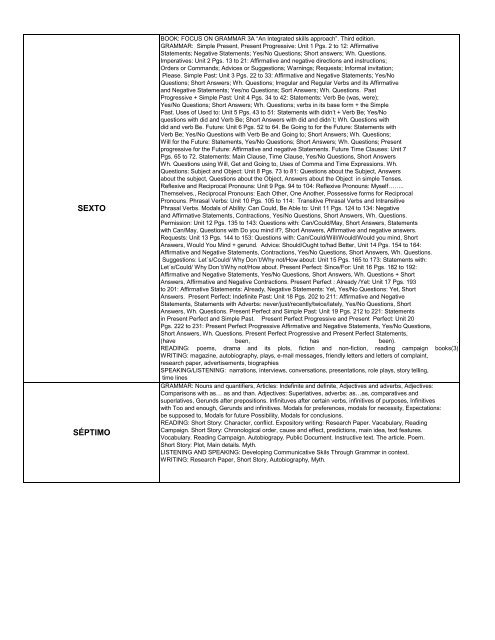prekinder kinder transición segundo primero plan general de ...
prekinder kinder transición segundo primero plan general de ...
prekinder kinder transición segundo primero plan general de ...
You also want an ePaper? Increase the reach of your titles
YUMPU automatically turns print PDFs into web optimized ePapers that Google loves.
SEXTO<br />
SÉPTIMO<br />
BOOK: FOCUS ON GRAMMAR 3A “An Integrated skills approach”. Third edition.<br />
GRAMMAR: Simple Present, Present Progressive: Unit 1 Pgs. 2 to 12: Affirmative<br />
Statements; Negative Statements; Yes/No Questions; Short answers; Wh. Questions.<br />
Imperatives: Unit 2 Pgs. 13 to 21: Affirmative and negative directions and instructions;<br />
Or<strong>de</strong>rs or Commands; Advices or Suggestions; Warnings; Requests; Informal invitation;<br />
Please. Simple Past: Unit 3 Pgs. 22 to 33: Affirmative and Negative Statements; Yes/No<br />
Questions; Short Answers; Wh. Questions; Irregular and Regular Verbs and its Affirmative<br />
and Negative Statements; Yes/no Questions; Sort Answers; Wh. Questions. Past<br />
Progressive + Simple Past: Unit 4 Pgs. 34 to 42: Statements: Verb Be (was, were);<br />
Yes/No Questions; Short Answers; Wh. Questions; verbs in its base form + the Simple<br />
Past. Uses of Used to: Unit 5 Pgs. 43 to 51: Statements with didn’t + Verb Be; Yes/No<br />
questions with did and Verb Be; Short Answers with did and didn´t; Wh. Questions with<br />
did and verb Be. Future: Unit 6 Pgs. 52 to 64. Be Going to for the Future: Statements with<br />
Verb Be; Yes/No Questions with Verb Be and Going to; Short Answers; Wh. Questions;<br />
Will for the Future: Statements, Yes/No Questions; Short Answers; Wh. Questions; Present<br />
progressive for the Future: Affirmative and negative Statements. Future Time Clauses: Unit 7<br />
Pgs. 65 to 72. Statements: Main Clause, Time Clause, Yes/No Questions, Short Answers<br />
Wh. Questions using Will, Get and Going to, Uses of Comma and Time Expressions. Wh.<br />
Questions: Subject and Object: Unit 8 Pgs. 73 to 81: Questions about the Subject, Answers<br />
about the subject, Questions about the Object, Answers about the Object in simple Tenses.<br />
Reflexive and Reciprocal Pronouns: Unit 9 Pgs. 94 to 104: Reflexive Pronouns: Myself……..<br />
Themselves., Reciprocal Pronouns: Each Other, One Another, Possessive forms for Reciprocal<br />
Pronouns. Phrasal Verbs: Unit 10 Pgs. 105 to 114: Transitive Phrasal Verbs and Intransitive<br />
Phrasal Verbs. Modals of Ability: Can Could, Be Able to: Unit 11 Pgs. 124 to 134: Negative<br />
and Affirmative Statements, Contractions, Yes/No Questions, Short Answers, Wh. Questions.<br />
Permission: Unit 12 Pgs. 135 to 143: Questions with: Can/Could/May, Short Answers, Statements<br />
with Can/May, Questions with Do you mind if?, Short Answers, Affirmative and negative answers.<br />
Requests: Unit 13 Pgs. 144 to 153: Questions with: Can/Could/Will/Would/Would you mind, Short<br />
Answers, Would You Mind + gerund. Advice: Should/Ought to/had Better, Unit 14 Pgs. 154 to 164:<br />
Affirmative and Negative Statements, Contractions, Yes/No Questions, Short Answers, Wh. Questions.<br />
Suggestions: Let´s/Could/ Why Don´t/Why not/How about: Unit 15 Pgs. 165 to 173: Statements with:<br />
Let´s/Could/ Why Don´t/Why not/How about. Present Perfect: Since/For: Unit 16 Pgs. 182 to 192:<br />
Affirmative and Negative Statements, Yes/No Questions, Short Answers, Wh. Questions + Short<br />
Answers, Affirmative and Negative Contractions. Present Perfect : Already /Yet: Unit 17 Pgs. 193<br />
to 201: Affirmative Statements: Already, Negative Statements: Yet, Yes/No Questions: Yet, Short<br />
Answers. Present Perfect: In<strong>de</strong>finite Past: Unit 18 Pgs. 202 to 211: Affirmative and Negative<br />
Statements, Statements with Adverbs: never/just/recently/twice/lately, Yes/No Questions, Short<br />
Answers, Wh. Questions. Present Perfect and Simple Past: Unit 19 Pgs. 212 to 221: Statements<br />
in Present Perfect and Simple Past. Present Perfect Progressive and Present Perfect: Unit 20<br />
Pgs. 222 to 231: Present Perfect Progressive Affirmative and Negative Statements, Yes/No Questions,<br />
Short Answers, Wh. Questions. Present Perfect Progressive and Present Perfect Statements,<br />
(have been, has been). .<br />
READING: poems, drama and its plots, fiction and non-fiction, reading campaign books(3)<br />
WRITING: magazine, autobiography, plays, e-mail messages, friendly letters and letters of complaint,<br />
research paper, advertisements, biographies<br />
SPEAKING/LISTENING: narrations, interviews, conversations, presentations, role plays, story telling,<br />
time lines<br />
GRAMMAR: Nouns and quantifiers, Articles: In<strong>de</strong>finite and <strong>de</strong>finite, Adjectives and adverbs, Adjectives:<br />
Comparisons with as… as and than. Adjectives: Superlatives, adverbs: as…as, comparatives and<br />
superlatives, Gerunds after prepositions. Infinituves after certain verbs, infinitives of purposes, Infinitives<br />
with Too and enough, Gerunds and infinitives. Modals for preferences, modals for necessity, Expectations:<br />
be supposed to, Modals for future Possibility, Modals for conclusions.<br />
READING: Short Story: Character, conflict. Expository writing: Research Paper. Vacabulary, Reading<br />
Campaign. Short Story: Chronological or<strong>de</strong>r, cause and effect, predictions, main i<strong>de</strong>a, text features.<br />
Vocabulary. Reading Campaign. Autobiograpy. Public Document. Instructive text. The article. Poem.<br />
Short Story: Plot, Main <strong>de</strong>tails. Myth.<br />
LISTENING AND SPEAKING: Developing Communicative Skils Through Grammar in context.<br />
WRITING: Research Paper, Short Story, Autobiography, Myth.


